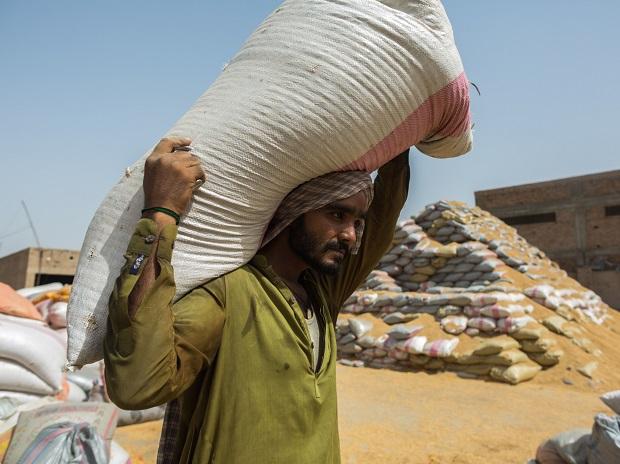By Rajendra Jadhav and Mayank Bhardwaj
MUMBAI (Reuters) – India, the world’s biggest rice exporter, is considering whether to restrict exports of 100% broken rice, government and industry officials told Reuters on Friday, after the paddy area has been reduced by a lack of rainfall.
The potential export curbs could lift rice prices globally because India accounts for more than 40% of the world’s rice shipments. It could also hit a few poor African countries that import 100% broken rice for human consumption, though that variety is mainly used for feed purposes.
“We have been discussing whether we need some sort of curbs on 100% broken rice exports,” said a senior government official involved in the decision process.
India is more than comfortable in terms of both private and government rice stocks, so there is no point considering any curb on overall rice exports, the official said, adding that the discussions are confined to broken rice.
The state-run Food Corporation of India held 41 million tonnes of milled and rice paddy stocks as of Aug. 1, far above the government’s requirement of 13.5 million tonnes by July 1.
Below-average rainfall in key rice-producing states such as West Bengal, Bihar and Uttar Pradesh prompted the latest discussions in a country that has already banned wheat exports and restricted sugar shipments this year.
India’s farmers have planted paddy on 34.37 million hectares, down 8.3% from a year ago, farm ministry data showed last week.
India usually exports 5% and 25% broken rice, but demand for 100% broken rice has risen sharply in recent months, particularly from drought-hit China, exporters said.
“The local cattle feed industry has been demanding a restriction on exports of 100% brokens so they can have more supplies,” said one exporter based in Andhra Pradesh.
In 2021 India exported 21.5 million tonnes of rice, including 3.6 million tonnes of broken rice.
China was the biggest buyer of broken rice, with purchases of 1.1 million tonnes in 2021, while African countries such as Senegal and Djibouti bought brokens for human consumption.
“Instead of banning, the government should impose duty on the exports. This will help India keep a presence in the market and allow African countries to import,” said B.V. Krishna Rao, president of the All India Rice Exporters Association.
The price difference between 100% broken and 5% broken has dropped to $15 a tonne from more than $70 a year ago, exporters said.
India’s 5% broken white rice was quoted around $340 a tonne this week, against $325 for 100% broken white rice, they said.
(Reporting by Mayank Bhardwaj and Rajendra Jadhav; Editing by David Evans and David Goodman)
(Only the headline and picture of this report may have been reworked by the Business Standard staff; the rest of the content is auto-generated from a syndicated feed.)
 Dear Reader,
Dear Reader,
Business Standard has always strived hard to provide up-to-date information and commentary on developments that are of interest to you and have wider political and economic implications for the country and the world. Your encouragement and constant feedback on how to improve our offering have only made our resolve and commitment to these ideals stronger. Even during these difficult times arising out of Covid-19, we continue to remain committed to keeping you informed and updated with credible news, authoritative views and incisive commentary on topical issues of relevance.
We, however, have a request.
As we battle the economic impact of the pandemic, we need your support even more, so that we can continue to offer you more quality content. Our subscription model has seen an encouraging response from many of you, who have subscribed to our online content. More subscription to our online content can only help us achieve the goals of offering you even better and more relevant content. We believe in free, fair and credible journalism. Your support through more subscriptions can help us practise the journalism to which we are committed.
Support quality journalism and subscribe to Business Standard.
Digital Editor



 Dear Reader,
Dear Reader,

GIPHY App Key not set. Please check settings